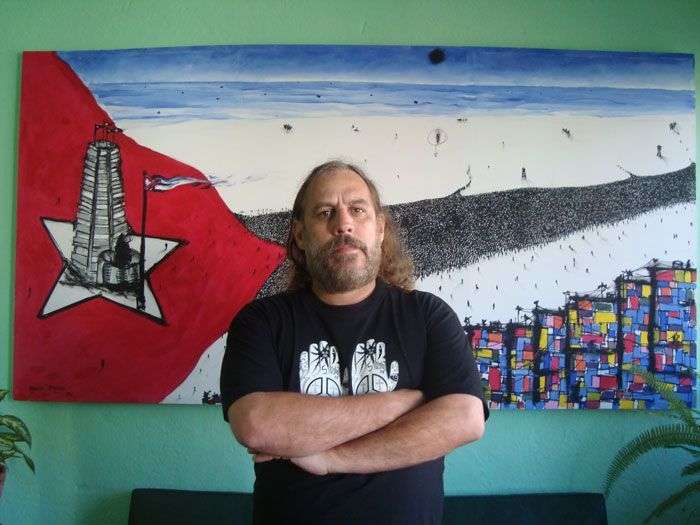Fran Delgado calls himself a committed artist. He is committed with his principles, his hybrid faith and his roots. He claims to have more plans than time to put them into practice; yet he made room for meeting OnCuba as prelude to the concert he offered yesterday afternoon at the Rampa Art Fair, at the Pabellon Cuba.
With a deep influence from traditional trova songs, son and other Cuban rhythms, he performed the usual tracks that made him one of the most popular Cuban trova singers of all times and others from his latest album SOS which is not finished yet.
Many people say that most singers and songwriters relax as they come of age, in what stage are you in at present?
Indeed many things change with age. While we are younger we are like sponges absorbing the world and reinterpreting it. Some people relax when they reach a certain status and get into some sort of bubble. Fortunately, I have never had that chance of going so far in a bubble. When we are younger we are more daring and less prejudiced subconsciously. We get everything we hear and perhaps melodies are better with the freshness of the first time. As we grow up we are more knowledgeable and we learn some tricks, we cut here, paste there and steal. We become rather craftsmen than spontaneous artists.
When I was more creative there were barely a few recording studios and my whole work from the 80’s and the 90’s got lost because I didn’t have the means to register it. My songs were badly recorded directly in some concert. It wasn’t till the end of 1995 that I finished my first album. I didn’t do it in a studio, I did it live, it was called Trovatur. I lost partof the work that had to do with the time Icreate it, because it is impossible to get them out of their context, so it is necessary to record them at that time. I still preserve some of them, but others have lost their meaning.
There was a lot of immediacy in my creations back then. In 1997, I also recorded live La Habana esta de bala, till 1999 I finally recorded an album in a studio, El adivino. In 2004, I recorded Mimapa. I arrived late at the studios and also to the democratization of digital supports so right now I’m in some sort of trip to the seeds, returning to that childhood where there are things I can still rescue and record. Perhaps they won’t be as spontaneous as during my youth because now I do many things that not only have to do with culture. I develop those alternative activities in order to survive because I’m not divorced from reality.
I always did well, even during the special period when I wrote my songs. I kept on writing songs inspired in that epoch, where people lived from their guitar and their bicycle. Now I’m comfortably off and I want to do the things I couldn’t do at that time.I work a lot, as I never have, in El Sauce, Pepito’s Bar and even I discovered I had a DJ in me. I have learned to work the evenings in Havana; I learned the codes and how to deal with the audience that not only consumes music. Some things we didn’t have when we were younger and played just for the sake of it and with our wages which were not enough for making a living. I’m no longer as sensitive as before and I’m still hopeful I can write nice songs. I long for recording an album with songs I only wrote with the guitar. I’m on the most ambitious stage of my career. I want to do some theater, musicals, and choirs. I have more plans than time to put them into practice.
What do you feel committed to lately?
First of all, I’m committed to myself. We were trova singers, as I told you before, for the sake of it, we didn’t get a wage from the state and we didn’t care if one song was more successful than the other. We were not conditioned by anyone and we didn’t make any concessions. I still have the compass of the 80’s and the 90’s. My songs are committed to my faith and the hybrid ideology I profess, but many of my colleagues from my generation and I have always defended commitments with aesthetics and true art. Artists can be either creators or slaves; I have always tried to take people to a higher level of sensitivity.
What can you tell us about your experiences with your work and censure?
At some pointe Buena Fe invited me to perform at the Karl Marx Theater and one of its directors told me I was banned there. The band then interpreted La otra orilla. That has been the greatest obvious censure I have experienced. For instance, when I released Trovatur the radio only played Utopias, which is pretty harmless. I sang Angola in a theater of the Ministry of the Interior (MININT by its acronym in Spanish) and no one applauded and then on the street I ran into an officer who congratulated me. Censure turns you into a mythic being. It launches you as well as many others that are known precisely for the fact of being censured. Stories start to be intertwined about police officers taking the audience to the station and about reprimands and prohibitions. Even though this may be a paradox, censure has favored me a lot. The more they say something is banned, the more people look for it. I have never been an artist of the media because I didn’t like the way TV shows were produced. I still don’t like them; I just go for a specific purpose because I think our television has no dynamics.
What does it mean for Frank Delgado to write, perform and live in Cuba?
We don’t choose where to be born. We are born in a country we can either love or hate and I know people that always knew they didn’t want to live here. I was never one of those. I remember that when I was 19 years old I was in college and I was shocked by the number of friends that left from Cuba because for them it was not their future, for me it always was. I was always excited with all the good stuff going on here. My father was a revolutionary so I have been nourishing from that since little. As every Cuban family, mine was divided and I went through the drama of migration. I always knew I belonged here. Despite the Special Period, when many people started to question about that, I always wanted to stay. Back then I started travelling and I lived some time out of here.
In 1995 I was tempted to settle in Spain, I was well-paid and people liked my work but I returned in the midst of the most critical moment and I arranged a concert at the National Theater. About 1000 people attended the concert and all of them la-la-la the songs. I thought about that concert for some time. I felt it was useful and even though I had no place to live, nor money, nor anything, I felt I belonged here. Back then it was easy for my to travel, in fact I travelled a lot but I always returned. I learned to live like that, though Cuba sent me away sometimes I always returned.
Everything I do is full of common places and names in Cuba. My work is full of words and expressions usually used in Cuba. I’m of the opinion that music has to do with origins; I just care about the authentic and autochthonous. I enjoy the Cuban rhythms and idiomaticy. Regardless of local elements, foreigners get me and learn about Cuban geography and culture, as we learn about Spain in Joaquin Sabina’s lyrics. You can know a country, but if you are not familiar with its soundtrack you will not fully get it. Lyrics are really important because that three-minute long literature can teach us a lot. My lyrics are always about Cuba and its main characters.










